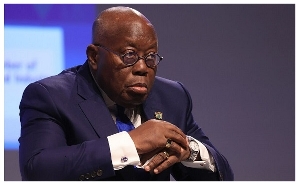When Ghana joined the ranks of oil and gas exporting nations in late 2010, it helped turn the West African country into one of the continent’s top investment destinations. Unfortunately, it also prompted successive governments to borrow to the hilt.
In 2022, doubts over the country’s solvency turned into full-blown panic, investors dumped Ghana’s bonds and currency, and the government was forced to suspend interest payments on its external debt. Now the government hopes to turn a new page after agreeing with private creditors on a plan to restructure $13 billion of eurobonds.
1. Why was Ghana so popular among investors?
The first sub-Saharan African nation to gain independence after colonial rule, Ghana has been a bastion of stability in a region plagued by civil unrest and coups. Peaceful elections have been held regularly since the 1990s, power has changed hands between rival parties and presidents, and there is an independent judiciary and a vibrant parliament.
The country is the world’s second-biggest grower of cocoa and Africa’s No. 1 gold producer. A year after it began exporting oil, gross domestic product leaped by almost 14%. The economy has expanded every year since then, albeit at a more modest pace, with the government’s embrace of a free-market system helping to lure foreign capital and financing.
2. So what went wrong?
The government abandoned fiscal discipline and opened the spending taps in anticipation of an oil windfall. But energy revenue wasn’t enough to cover a succession of expensive flagship projects, and it borrowed more to plug the gap. Overspending was particularly rife in election years. President Nana Akufo-Addo’s administration scrapped fees for senior high school students. In 2021, the government spent $1 billion on refinancing loans owed by private power producers, a move that was intended to reduce the state’s electricity bills.
A plan to strengthen a banking industry weakened by bad loans has cost about 33 billion cedis ($2.2 billion). Covid-19 dealt a further blow to the state’s already stretched finances. After selling eurobonds for each of the previous nine years, Ghana was shut out of international capital markets in 2022 as investors lost faith in its ability to service its loans.
3. What precipitated the debt restructuring?
State debt ballooned, with the International Monetary Fund estimating that it equated to more than 100% of GDP in 2022. When the country could no longer tap international markets, the government resorted to taking out domestic loans, paying annual interest rates of almost 30%. The central bank stepped in to provide the government with funding after it risked defaulting on the local debt, but it decided to limit further support to stay within its legal lending threshold.
In December 2022, some lawmakers demanded that then-Finance Minister Ken Ofori-Atta take the fall for the economic crisis and called for his dismissal, but the ruling party ultimately refused to back a motion to censure him. It was only in February this year that he got replaced by Mohammed Amin Adam in a cabinet reshuffle.
4. How did the IMF become involved?
Ghana shunned a multilateral initiative that would have enabled it to suspend foreign debt interest payments, and said it wouldn’t seek help from the IMF, before changing its tune in July 2022. In late October that year, Akufo-Addo dismissed speculation that a funding deal could translate into losses for any of Ghana’s creditors, but a month later his administration said it would enter into talks on a debt restructuring.
The IMF signed off on a $3 billion extended-credit facility in May last year after Ghana reached an agreement in principle to overhaul its external debt. The financing, which included a $600 million immediate payment, was contingent on the government increasing taxes, imposing losses on investors and other tough measures.
It’s been a rocky journey but the government managed to complete a domestic debt exchange in 2023 and, in June 2024, reached a deal with official creditors to rework $5.1 billion of loans and the agreement in principle with private creditors.
5. How will investors be affected?>
The government is targeting $10.5 billion in external debt-service relief during its three-year program with the IMF. The deal reached with international bondholders means they are set to forgo $4.7 billion after agreeing to a 37% nominal haircut and a reduction in coupon rates. Bilateral lenders will get back 62 cents for every dollar lent, according to UK-based Debt Justice.
More relief is expected from commercial lenders. Interest payments on most external loans were suspended since December 2022. The holders of about two-thirds of Ghana’s domestic bonds have taken a hit, agreeing to voluntarily exchange existing securities for ones that pay less interest.
6. How have markets responded to the meltdown?
The crisis triggered an exodus from Ghana’s currency, the cedi, and its bonds, with dollar bond yields rising into double-digits and remaining there since 2022. The cedi declined 39% against the dollar that year, 15% in 2023 and 21% so far this year. The premium investors demand to hold the country’s dollar bonds rather than US Treasuries still exceeds 2,200 basis points, well above the 1,000 level that signals distress, according to JPMorgan Chase & Co. indexes.
Business News of Monday, 1 July 2024
Source: bloomberg.com













